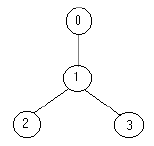http://acm.hdu.edu.cn/showproblem.php?pid=1054
Problem Description
Bob enjoys playing computer games, especially strategic games, but sometimes he cannot find the solution fast enough and then he is very sad. Now he has the following problem. He must defend a medieval city, the roads of which form a tree. He has to put the minimum number of soldiers on the nodes so that they can observe all the edges. Can you help him?
Your program should find the minimum number of soldiers that Bob has to put for a given tree.
The input file contains several data sets in text format. Each data set represents a tree with the following description:
the number of nodes
the description of each node in the following format
node_identifier:(number_of_roads) node_identifier1 node_identifier2 ... node_identifier
or
node_identifier:(0)
The node identifiers are integer numbers between 0 and n-1, for n nodes (0 < n <= 1500). Every edge appears only once in the input data.
For example for the tree:
the solution is one soldier ( at the node 1).
The output should be printed on the standard output. For each given input data set, print one integer number in a single line that gives the result (the minimum number of soldiers). An example is given in the following table:
Sample Input
4 0:(1) 1 1:(2) 2 3 2:(0) 3:(0) 5 3:(3) 1 4 2 1:(1) 0 2:(0) 0:(0) 4:(0)
Sample Output
1 2
题意分析:
有一个城市包含多条路线,在每个点可以派士兵驻守,驻守的士兵可以守护与这个点相连的道路,问最少需要多少士兵。
解题思路:
最小点覆盖的定义:假如选了一个点就相当于覆盖了以它为端点的所有边。最小顶点覆盖就是选择最少的点来覆盖所有的边。
最大独立集=总数-最小点覆盖,
最小点覆盖=最大匹配数。
#include <stdio.h>
#include <vector>
#include <string.h>
#define N 1520
using namespace std;
vector<int>e[N];
int m[N], n, book[N];
int dfs(int u)
{
int k, i;
k=e[u].size();
for(i=0; i<k; i++)
{
if(!book[e[u][i]])
{
book[e[u][i]]=1;
if(m[e[u][i]]==-1 || dfs(m[e[u][i]]))
{
m[e[u][i]]=u;
return 1;
}
}
}
return 0;
}
int main()
{
int i,ans, u, v, t;
while(scanf("%d", &n)!=EOF)
{
memset(m, -1, sizeof(m));
for(i=0; i<n; i++)
e[i].clear();
for(i=0; i<n; i++)
{
scanf("%d:(%d)", &u, &t);
while(t--)
{
scanf("%d", &v);
e[u].push_back(v);
e[v].push_back(u);
}
}
ans=0;
for(i=0; i<n; i++)
{
memset(book, 0, sizeof(book));
if(dfs(i))
ans++;
}
printf("%d
", ans/2);
}
return 0;
}